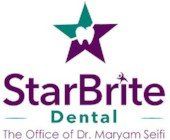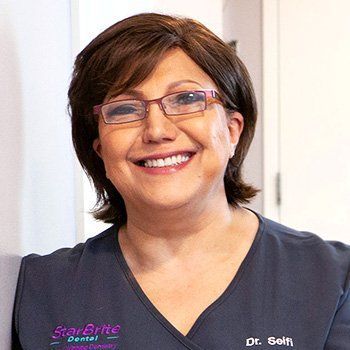Missing All Upper and Lower Teeth
If you are missing all your teeth, you have plenty of company. It’s estimated that about 40 million Americans are missing all their teeth. The answer when a person is missing all their teeth is a complete set of dentures.
For Americans who are above the age of 65, as many as 30% now have no natural teeth. This is not a new problem—it’s a problem as old as mankind. Some effort to create dentures goes back nine thousand years, that we know of.
Today, however, we have choices that are comfortable and workable. Those with missing teeth have two choices for their dentures: traditional dentures that fit closely to the gums and palate, and dentures that are supported by dental implants. Either method is an answer to how to replace missing teeth.
The right choice depends on your desires and the results of a detailed examination of your oral anatomy. When you come to us for replacement teeth, we will carefully educate you on our recommendations and the reason for them.
Why Do Some People Lose All Their Teeth?
There are actually several reasons a person loses all their teeth.
- Periodontitis: The most usual reason is advanced gum disease called periodontitis. This disease damages the bone that supports the teeth. The teeth then begin to get loose and are non-viable. Any remaining teeth will be extracted before dentures are planned.
- Lack of proper care: Some people who do not care for their teeth with regular brushing and professional care may have many infected and decayed teeth. It may not be possible to save them.
- Injuries: Injuries and trauma can cause a person to lose a few or even several teeth.
- Smoking: Smoking can take a toll on the health of teeth and gums, which can lead to tooth loss.
- Poor nutrition: Lack of essential nutrients to maintain gum and bone health can cause tooth loss. Vitamin C is particularly essential for healthy gums.
- Other health conditions: Conditions like diabetes, high blood pressure and rheumatoid arthritis can injure the teeth and gums, resulting in the loss of all teeth.
How to Get New Teeth
Fortunately, in America, most dentists offer some type of dentures for their patients. This makes it relatively easy to obtain complete teeth replacements. What is important, then, is to ensure that you have chosen a dental office with very high standards of quality and care.
No matter what type of denture you choose, the quality of your treatment from the very beginning of this process has great bearing on the success of your dentures. While many dentists provide dentures, you have only to talk to someone about their traditional dentures to hear stories about denture problems. Loose dentures, dentures that make sore spots on the person’s gums, dentures that need to be relined frequently—there can be many problems with fit or comfort.
These challenges mean that the more highly skilled and caring your dentist, the better your experience is likely to be. At StarBrite Dental, we have very high standards of care for each of our patients, starting with the first moments they enter our practice and extending all the way through their comfortable wearing of our dentures. We want to make sure that you are not only comfortable wearing your dentures, but also that they work perfectly for you in your daily life. We will be satisfied with nothing less.
Options for a New Full Set of Teeth
The two most popular and practical methods of complete teeth replacement are traditional dentures and implant-supported dentures. We will explain the differences between these two processes.
There are other choices that we have not found to be as successful. In fact, we have seen many patients who want to discontinue using these other options, so they consult with us for a better solution. They know that for our patients, only the best quality is acceptable. From the skills of our dentists to the materials and procedures we use, we insist on the best quality in every service we provide.
One of these choices is what’s referred to as “economy dentures.” They are not customized to the patient and they are inexpensive. They must be secured in place with dental adhesive because they do not closely fit to the gums. They often look like artificial teeth rather than natural teeth. It’s possible that, for a while, a person may have no other choice for a temporary solution. They would be smart to seek a better solution before economy dentures can create problems for their gums and bone.
When we prepare dentures for our patients, it’s important to us that they look completely natural and that they enhance the patient’s appearance. We consult with each patient before manufacturing their new dentures to determine just how they want their dentures to look. We only use the best materials for longevity as well as great appearance.
Traditional, Complete Dentures
In the 1930s, a new type of synthetic resin was created and made available to dentists. At this point, dentists began to work with synthetic resins to create customized dentures that fit better and were more comfortable.
For some people, traditional dentures to replace missing teeth are the best choice. With accurate fitting and superior materials, our dentists can provide comfortable, long-lasting and natural-looking dentures.
List of Services
-
How Traditional Dentures WorkList Item 1
Traditional dentures are crafted from resins, acrylics and possibly porcelain and are designed to fit snugly against the jaws and gums. The upper plate will fit closely to the gums and the palate. The lower plate will rest on the gums and bone. When the fit is accurate and enough bone is present, no dental adhesive will be needed.
As a person continues to wear dentures, they may experience bone loss because there is little stimulus received by the upper and lower jaw bones. Lack of biting or chewing stimulation means that this bone will gradually shrink. As it does, the dentures will loosen. A patient may solve this problem for a little while by using an adhesive. The denture can also be relined to change the fit so it is more secure.
Every several years, a new set of dentures will need to be manufactured as they can get worn down past the point of repair.
-
The Procedure for Supplying Traditional DenturesList Item 3
If you have opted for traditional dentures, the process will involve several steps.
- A thorough examination will look for any infection or signs of health problems in the mouth. Because there are no teeth when a person needs a full set of teeth, the examination will look at the health of the gums, upper and lower jaw bone and surrounding structures. Any problems here must be resolved before dentures can be made.
- Your dentist will discuss with you how you want your dentures to look. You will agree on shape, color and more.
- An impression will be taken of your gums and mouth. Careful attention will be paid to how far the jaw should close when the teeth are together to ensure that the temporomandibular joint is in the proper position.
- The dentures will be manufactured at a trusted dental lab.
- The dentures will be tried out to ensure they fit comfortably. Any needed adjustments will be made. The patient will be instructed on the proper care and maintenance for the dentures.
- The patient will wear the dentures and get used to talking and eating with them.
- It is common for there to be a few adjustments to get the denture just right for the patient so follow up appointments should be expected.
Implant-Supported Complete Dentures
The other choice for dentures, and one that is gaining great popularity, is implant-supported dentures. These dentures do not rest directly on the gums, they attach to dental implants that have previously been placed in the bone of the jaw. Because they are locked in, they do not shift or become loose. These dentures are sometimes referred to as overdentures.
We love implant-supported dentures because they enable us to give our patients an excellent experience. Our patients who choose these dentures tell us that many of the problems they had with their traditional dentures no longer bother them. Because our purpose is to provide excellent quality of care with every treatment, we are in favor of implant-supported dentures because of the good experiences so many of our patients have had with them.
List of Services
-
How Implant-Supported Dentures WorkList Item 1
Implant-supported dentures naturally require dental implants to be placed first. Then the patient can be provided with dentures that fasten to the dental implant. Some dentures snap into the dental implants, enabling the dentures to be removed and allowed access to clean both dentures and implants. Other implant-supported dentures are permanently attached to the implant, requiring a trip to the dentist to remove and clean them.
If you are being provided with implant-supported dentures at StarBrite Dental, we will educate you on the differences and advantages of each type of denture. Because our primary concern is your good result and satisfaction, we'll explain any recommendation to you. We want your choice to be based on an understanding of the health of the bone in your jaw and the result you want. Your lifestyle, preferences and appearance will always be taken into account so we can ensure that the quality of our care is always top notch.
Whether they are permanently attached or removable, our dedication to quality care means that we strive for your complete comfort and effortless functionality once you receive your dentures.
-
The Procedure for Supplying Implant-Supported DenturesList Item 2
- As with traditional dentures, the first step is a thorough examination to ensure that your gums and supporting bone are healthy.
- The examination will require detailed imagining so we can detect any weak or thin areas of bone. For full mouth dental implants, you will need to have sturdy bone in all of the areas where these titanium dental implants will be placed.
- Careful study of your imaging will enable us to plan the perfect areas in which to place dental implants. For most full mouth dental implants, six placements are needed in the upper and the lower jaw bones. Implants will be placed in the bone in the most advantageous positions to utilize your strongest bone.
- Once all planning and measurements are done, we will place all these implants. This is a significant surgical procedure and you should be prepared to take time off so your body can heal afterwards.
- You will be provided with temporary dentures to wear as the dental implants heal.
- After the implants have healed well, caps called abutments will be affixed to the implants. These abutments will be important as we align your final dentures to these connections.
- When the implants have integrated and bonded with your bone, then it will be time to design your new dentures. You will be consulted on the shape and color of your new teeth.
- In a careful process, your new dentures will be precisely engineered to fit your mouth. This may require a few visits. It is vital that we ensure that your lips close comfortably, that you can talk easily and that your temporomandibular joint is in a correct and relaxed position.
- Your new dentures will be manufactured by a trusted dental lab.
- When your dentures are ready, you will come into our office and try them on. They should fit perfectly and enable you to talk clearly. Your face and jaw should feel relaxed when your mouth is closed.
- You will wear your dentures and get used to them. Any adjustments that are needed will be made until you are completely happy with the result.
-
The Advantages of Implant-Supported DenturesList Item 3
Yes, there are many steps in being provided with implant-supported dentures, but the result is worth it because wearing implant-supported dentures is more effortless than any other system of tooth replacement. Here are the advantages our patients tell us about when we provide them with these dentures.
- The overdentures do not rest on the gums, they rest on the dental implants. You can still get sore spots, this means there is less pressure on the bone and thus preservation of it.
- They are less restrictions in what they can eat. Most can finally crunch into a juicy apple or eat popcorn, chewy meats or sticky foods like peanut butter.
- They can talk clearly because their dentures do not move while they speak.
- They can laugh and smile without worrying about their dentures moving.
- The dental implants pass along chewing and biting stimulus to the upper and lower jaw bones which helps keep them stronger.
- Implant-supported dentures are more comfortable in daily wear, when eating and when talking.
- There is no longer any need to use denture adhesives.
- A person’s digestion may improve because they can more thoroughly chew their food.
- Greater biting and chewing force is possible.
- Over a long term, patients often find they spend less money on repairs and replacements than with traditional dentures.
Finding the Right Care for Your Full Teeth Replacement
It’s very important to us that your new dentures give you an excellent experience. This positive experience should begin the moment you first meet us. We want to understand the needs and desires of each patient we see. As we get to know them, we can better educate them on their choices and our recommendations.
We have many patients that drive to our office from cities many hours away because they have already experienced our superior care. We want you to have an experience that is just as good. Every one of our staff is trained and dedicated to providing that positive experience and we believe you will notice the difference as soon as you arrive.
We have made sure that we have the best-qualified staff possible to provide you with superior care at each step of this process, whether you are getting traditional dentures or implant-supported dentures.
If you need replacements for a full set of teeth, please contact us with confidence. Just call our office at
(301) 770-1070 to schedule a consultation to get the process started. We are ready to help you get a fully-functional, long-lasting and beautiful new smile.
Contact Us to Schedule an Appointment Today!
*We DO NOT ACCEPT HMO Insurance, State Insurance, Medicaid/Medicare, or discount plans. Fees apply for services.
Evening and Weekend Hours Available
- Monday
- Closed
- Tuesday
- -
- Wed, Fri
- -
- Thursday
- -
- Saturday
- -
- Sunday
- Closed
Office
(301) 770-1070
Fax (301) 770-0544
5936 Hubbard Dr, Rockville, MD 20852


